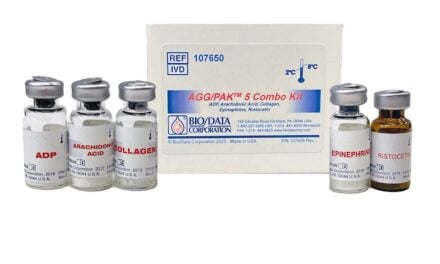Augurex Life Sciences Corp, Vancouver, BC, Canada, has announced that the protein 14-3-3?, a novel biomarker for rheumatoid arthritis (RA), is paving a future for better patient outcomes. In October, the US Patent and Trademark Office (USPTO) issued patent number 9,791,458, “Dissolved Protein Arthritis Markers,” related to assays for measurement of the protein 14-3-3? for the diagnosis and management of patients with RA.
Discovery of the protein’s role in arthritis was jointly made by researchers Aziz Ghahary, PhD, and Ruhangiz Kilani, MPH, PhD, at the University of British Columbia, and Walter Maksymowych, MD, at the University of Alberta.
Today, more than 50 million Americans are living with arthritis, a leading cause of disability among adults in the United States.1,2 Identifying those patients with early RA, for prompt intervention and tight treatment control, drastically improves outcomes. Issuance of the 14-3-3? patent confirms the important role of this blood test for patients, which is already supported by multiple peer-reviewed studies showing that 14-3-3? is a very early contributor to RA development and correlates with joint damage prognosis along the disease course.
“In agreement with the proposed biochemical role of 14-3-3? in the joint damage pathway, clinical studies have consistently demonstrated, from very early RA right through to established disease, that persistently elevated 14-3-3? blood levels predict rapid joint damage progression, even in patients who achieve clinical remission,” says Gilles Boire, MD, MSC, FRCP(C), professor in the division of rheumatology of the faculty of medicine at the University of Sherbrooke. “A persistent positive 14-3-3? test signals to the rheumatologist the need to treat patients with active disease more aggressively, and to ‘stay the course’ even after the patient achieves clinical remission.”
The 14-3-3? blood test is available in the United States through LabCorp, Quest Diagnostics, and RDL Reference Laboratory. JointStat (14-3-3?) is CE marked and approved by the Australian Therapeutic Goods Administration for clinical use in Europe and Australia. In Canada, the test is available through LifeLabs. In Japan, it is available through Medical & Biological Laboratories.
For more information, visit Augurex Life Sciences Corp.
REFERENCES
-
Hootman JM, Helmick CG, Barbour KE, Theis KA, Boring MA. Updated projected prevalence of self-reported doctor-diagnosed arthritis and arthritis-attributable activity limitation among US adults, 2015–2040. Arthritis Rheumatol. 2016;68(7):1582–1587; doi: 10.1002/art.39692.
-
Barbour KE, Helmick CG, Theis KA, et al. Prevalence of doctor-diagnosed arthritis and arthritis-attributable activity limitation: United States, 2010–2012 [online]. Morbidity and Mortality Weekly Report. 2013;62(44):869–873. Available at: www.cdc.gov/mmwr/preview/mmwrhtml/mm6244a1.htm. Accessed October 18, 2017.





